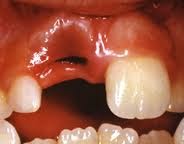 5 Ways to Treat a Knocked-Out Tooth
5 Ways to Treat a Knocked-Out Tooth
1. Time is of the Essence
When a baby gets a tooth knocked out, it's best to leave it for the tooth fairy, since trying to put it back could damage the permanent tooth coming in behind it. However, knocking out a permanent tooth is a different matter. If properly seated back into the socket, even with blood vessel and nerve damage to the tooth, the tiny ligaments in the jaw can reattach to the root. If a dentist can get the tooth treated and re-implanted within 30 minutes of the injury, there is a good chance that he can save the tooth. Odds of saving the tooth drop considerably if it's not successfully seated back into the socket within 24 hours of the injury.
2. Don't Forget the Tooth
In your hurry to get to the dentist, don't forget to find the tooth. Handle it gently by the crown, and avoid touching the root. If it's extremely dirty you can gently rinse it in milk if you have some available. If you don't have any milk, don't try to clean it. Avoid wiping it, scrubbing it or disinfecting it, no matter how dirty it seems. The cells located at the root end are delicate, and you'll need them to be intact and alive for a successful re-implantation.
3. Keep it Moist
You must keep the tooth moist to prevent the root cells from drying out. You have several options for keeping the tooth moist. Put the tooth back into the socket, exactly as it was, having the injured person hold it in place with his tongue, or place the tooth in the person's mouth between the cheek and gum. This may be a problem for a younger child because of the choking hazard, in which case you can have the child spit in a cup and then place the tooth in the cup. You can also place the tooth in a cup of milk or even water if you have nothing else. The goal is to handle the tooth as little as possible and keep it moist until you can get to the dentist's office or emergency room.
4. Time Will Tell
After preparing the tooth for implantation, your dentist will stabilize it in the socket by splinting or bonding it to the adjacent teeth. It usually takes 7 to 10 days for the tooth to heal. Your dentist will continue to monitor the tooth, and if it darkens or shows an indication that it didn't reattach properly, she may decide to perform a root canal in order to save it.
5. Be Prepared
If you or your children are involved in sports or other outdoor activities, you may want to consider carrying a tooth-saving kit. You may be able to purchase one from your dentist. It contains a protective case and a special solution that nourishes and protects the tooth for up to 24 hours.
Read more:
http://www.livestrong.com/article/11735-treat-knockedout-tooth/#ixzz1E2SALTS6


